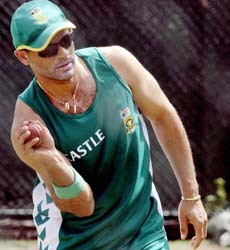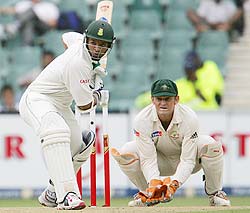 | « Back to article | Print this article |
Ashwell Prince is the modern face of South Africa. By installing him captain of the Test team for the tour of Sri Lanka in July, the country, in a way, exorcised the ghosts of apartheid.
Prince had, in that series, replaced the injured Graeme Smith as captain, thus entering the record books as the first ever black cricketer to lead South Africa.
When he first came on the scene in 2001-02, his selection was reviled as a 'quota' pick, and he was shown the door after a poor showing in four successive home Tests against lowly-rated Bangladesh, and Sri Lanka.
Ironic, therefore, that it was in Sri Lanka that his rehabilitation was complete; when he was installed as captain, he was being hailed as representative of a new generation with positive ideas.
A month earlier, he had married Melissa Kistensamy, whose grandfather migrated from India.
It is interesting, therefore, that Prince really came into his own as a batsman against India, in the ongoing Test series. His 97 in the second innings of the first Test was the sole shining light in a disastrous batting display by the home side; in the second Test, now into its second day, his 121 (Prince's fifth Test century) formed the spine around which South Africa built a fighting total of 328.
Managing Editor Sheela Bhatt had caught up with the 29-year-old batsman in Colombo. The first part of a two-part interview:
How did it feel to be appointed captain of South Africa?
Obviously, a very proud moment for me in my career. The convenor called me and I was nervous because I knew it was going to be big news. I heard a day before that the captain was injured, and when that guy called me, my heartbeat ran faster. It took a day to sink in.
How does captaincy change you?
As a person I won't change. My wife will always be there. I am a down to earth person. And the game is about the team, and not about one person. The team always comes first in cricket. Whatever decisions are made are always in the best interest of the team. That's how I live and that's how I do captaincy as well.
 Do you remember when you took up cricket?
Do you remember when you took up cricket?
I can't remember the first moment, but I have got a picture of me when I was about three years old. I played before that, but that picture shows me and my two brothers in our backyard. That picture reminds me how I started playing cricket.
Since the beginning, I have always been a batsman. I chopped my father's bat to fit me; I chopped the handle and blade of the bat. I chopped it to make it less bulky.
My father played club cricket. My youngest brother played cricket as well. On Saturdays, I used to follow them to the ground and keep scores and do stuff like that.
I played for the same club as my brother. In the early nineties, West Indies all-rounder Eldine Baptiste played for Eastern Province. He was an overseas player; he played for our club too. He was an international cricketer and he was the great example for me, because I got first hand experience of what it is like to be an international cricketer.
He was coaching us. The province had invited him; it was paying his professional fees. I had coaching from senior people from the club, but never from professionals. He was playing for the West Indies. When we watched him play, I could see how he moves around the field, how he paces around the field; his mannerisms on the field. Sometimes I used to go and ask him, and he would say, 'Come back tomorrow, I have to go to the gym now'.
Watching him day after day made me feel that you have to be fit to be a professional cricketer. Cricket is not just about batting and bowling. Going to the gym and eating the right food keeps you fit. I learnt those things from him.
Was it an easy journey for you up the cricket ladder?
No, it was not an easy journey. When I was a boy, South Africa was not playing international cricket. Before unification, things in the world of cricket were different. When things changed, a career in cricket became a possibility; not before that!
When did you start dreaming of becoming a cricketer?
When South Africa played for the first time, against India, in 1992. That was our first break into international cricket after affirmation. Only after that, it became a possibility and you could dream about being a cricketer. I saw all the games on TV. I remember the first match, when Donald took five wickets, but India won the game.
India won the second game, but South Africa won the third, and from there we went to the World Cup.
I remember the game because most of our guys were coming from Eastern Province. The provincial level is the highest you can go before going international. So you watch your province guys, how are they doing. My parents always supported me. I used to play football, soccer and all sorts of games when I grew up. In 1992, becoming a cricketer was a near possibility.
What makes one a good cricketer?
A lot of things. Obviously, you have to have some sort of talent. Talent can bring you the self-confidence, but you have to have discipline also. Go to the gym and keep fit. A lot of guys are lazy, and they just want to bat and bowl; they don't do the fitness part. For any sportsman to become an
When I saw South Africa playing against India, that game stuck in my mind. That game was played after international isolation against South Africa had ended. That game jazzed me, and I thought that I have to become an international cricketer.
Between the ages 15-20, what kind of work did you do to improve your skill sets?
I took coaching from that West Indian guy, Baptiste, right? Then, wherever you played, on ground or on the street, to us it was nothing about technique. You hit the ball as far as you could. That's how we used to play. When Baptiste started coaching us on the weekends, he used to say cricket is a side-on game. You have to stand sideways on your body. When a bowler is bowling at you, you have to stand sideways.
We used to just hit the ball. We didn't care about our body positions, whether we were bowling or batting. He said that you never play cricket with your chest facing the bowler. This is the first thing he told me, and it has always stuck with me.
Our pitches are for fast bowling. We are used to playing fast bowling. But Pakistan, India and Sri Lanka have many spin bowlers. So every time we came to tour here [in the subcontinent] we learn more about spin bowling. Sometimes in South Africa, we have no spin bowlers or maybe just one. While touring the Indian subcontinent, some of the senior players who have toured before tell us to watch out for this and watch out for that. Now we are more exposed to spin bowling.
 What made you click?
What made you click?
The thing that drives you is not the technique; it comes from inside. It's not that you are fit if you hit the ball, or it's not that if you hit ball hard then you become a good sportsman. I don't know how to explain it. I can't express my sentiments, but for me something you paint in your mind, some picture in your mind, and next day when you wake up in morning you want to become that one day.
Every time I wake up in morning I have to do my best to get closer to that picture. I have many friends more talented than me. We played in provinces and tournaments, but you may get side-tracked by different things in life. For me it was not difficult, because I had in mind that picture. I was trying to get to that picture.
What contributed towards you getting the break in Test cricket?
My Test debut was against Australia. I didn't do badly; I scored 49 in my first innings and another 50-something in the second. But I was too relaxed, because I had achieved my goal: to play for South Africa.
A year later I was left out of that team. That was the worst moment of my career. I mean, to play for South Africa was a dream, but then cricket is not just about playing one game. Once you have the taste of international cricket you want more. You just don't want to play one game; you want to succeed.
I didn't succeed in my first days. I had a good look at myself. I knew what I had to do: I want to play the best cricket. I have to do things consistently. I went back to provincial cricket and fought my way back.
I didn't do any radical changes in my playing; it was more mental. You know hundreds of people want to come; hundreds of them want to replace you, so you keep getting anxious, keep yourself under a lot of pressure. I wanted another chance to just enjoy it more. I read about guys who played successfully as well. In the twenties, you don't want to read, you don't want to know. But I learnt it again.
South Africa's politics and sports were dominated by a few whites. Didn't that deter you?
The way I see it is that when I was young and naïve, I saw that we had played international cricket. If we were allowed to play international cricket, that means things were going to change. Maybe now it's in the hands of whites, but when I will be grown up, change will have taken place. As a youngster that was my thinking. They will not allow us in the international cricket if things are not going to change in South Africa, right?
Soon after that we had the first black president, Nelson Mandela, and things started changing. If you look back, ten-twelve years down the line, it's a slow process, but its changing.
Some believe that your becoming captain is a major turning point. They say that South Africa's cricket is coming to terms with the reality of equality. Beyond racism, is this a new South Africa?
Like I said before, there are a lot more black people, coloured, non-whites; whatever you call them, they are playing; now even Indians are there. Hashim Amla is playing with us. More such guys play. Sooner or later one of them is going to become captain, so it was always going to be a matter of time before one of us was made captain. The fact that I am the first person is a great honour for me, but I see myself as a cricketer.
I don't want to see myself as white or black. I am sure if he is a white person he will have the same feeling on becoming captain, as it is for a black person.
But won't you say that your selection as captain has ended one more chapter of racism?
No, I won't say that. My country is changing since a long time. There are lots more opportunities for people to do things they like. All I can say is that may be ten years down the line, what it (selection as captain) meant for our country. Now, the captain and vice-captain are injured so who is the next best person on hand? Me. That's how I see it.